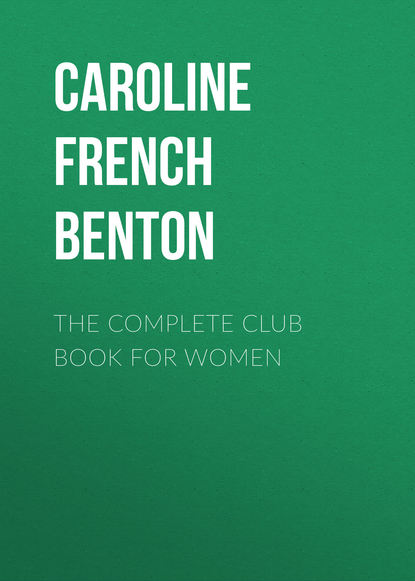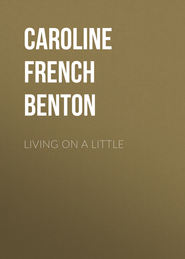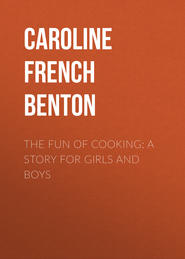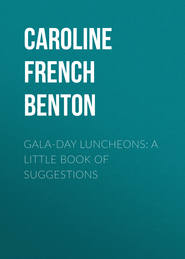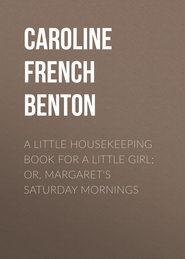По всем вопросам обращайтесь на: info@litportal.ru
(©) 2003-2024.
✖
The Complete Club Book for Women
Настройки чтения
Размер шрифта
Высота строк
Поля
This will bring in the romantic stories of the buccaneers; read of the extraordinary careers of Captain Henry Morgan, the notorious Blackbeard, and Captain Kidd, and have chapters from novels treating of that time, such as Charles Kingsley's "Westward Ho!" and "To Have and To Hold," by Mary Johnston.
Give the story of each important island: Jamaica, Santa Cruz, the two little republics of Haiti and Santo Domingo, Barbados, and Martinique, the last the birthplace of the Empress Josephine. The topic of slavery should have one paper. Read from the life of William Wilberforce.
Take next Cuba and Porto Rico. Study the war between Spain and the United States, and follow with the conditions to-day. Read from "The West Indies," in the Story of the Nations series (Putnam); "The English in the West Indies," by J. A. Froude (Longmans); and "On the Spanish Main," by John Masefield (Macmillan).
X – BERMUDA AND THE AZORES
North of the West Indies lies a group of islands famous for their beauty – the Bermudas. Here Shakespeare placed the scene of "The Tempest." The English own the islands and maintain a military station there. Read from "The Tempest." Follow with a paper on the Azores, in mid-Atlantic.
Circling the North American Continent, clubs will find several separate islands full of interest. Little Staten Island, in New York Harbor, and Long Island are closely connected with our history. Cape Breton Island, on the northern coast of Nova Scotia, holds the old stronghold of Louisburg, and the beauty of the Bras d'Or Lakes is worthy of note. Read "Baddeck and that Sort of Thing," by Charles Dudley Warner (Houghton Mifflin Co.). Newfoundland, rugged and lonely, lies beyond. In spite of its great fisheries on the Banks, its people are poor. Read of the work of Grenfell among them. The Arctic islands farther north present little to study, if we except Iceland, well to the northeast. This is truly a wonderful little place, and clubs should give it one meeting. Its relation to literature is important. Read the little classic, "An Iceland Fisherman," by Pierre Loti (McClurg), and "Bound About the North Pole," by W. J. Gordon (Dutton).
Crossing to the west coast of British Columbia one meeting might be given to the Alaskan Island of Saint Lawrence and others of the Aleutian group; then, coming down the coast, Queen Charlotte's Island and Vancouver should be noted briefly. On the west coast of South America is the little island of Juan Fernandez, on which the sailor Alexander Selkirk spent five years alone, whose story suggested to Defoe his "Robinson Crusoe."
Just around Cape Horn lies the strange, wild land of Tierra del Fuego, of which little is known. Darwin, however, wrote of it in his "Voyage of a Naturalist," and scientists find in it much of interest.
CHAPTER VI
The Business of Being a Housekeeper
The following topics have been arranged in ten groups, but as many more may be added by dividing each main group into two, or even three or four. There may be readings at each meeting from the books given for reference, and discussion by club members.
I – INTRODUCTORY
The subject for the first meeting may be the Old Housekeeping and the New. One paper may take the comparison of housekeeping twenty years ago and more and that of to-day. Is there a real difference, or only a seeming one! Are rents, food, and clothing actually higher for the same things, or does life to-day demand that we add to what we then had? Assuming that prices have really gone up, and are to stay there, what can women do to adjust themselves to the fact?
The second paper should speak of the necessity of a woman's knowing exactly what she can have to spend; of knowledge of her husband's business; of an allowance; of the need of training in keeping within a fixed sum.
The third paper is to be on the budget. That is, on preparing a list of expenses, setting them down in a book, apportioning the income among the items, and then putting down each day and month the actual outgo, and so, year by year, altering and arranging the expenses to meet the income. The discussion should take the form of personal experiences in keeping household accounts.
II – SYSTEMATIC HOUSEKEEPING
The introductory paper on this subject may speak of the complex way in which our houses are furnished, and the superfluity of things in them. Also the fact that the day's work of caring for them is not always clearly defined and carried out.
The second paper may treat of the relief of a weekly schedule of work to be done.
The third paper may take the topic of the conservation of a woman's energy, and the carelessness with which she runs up and down stairs and does unnecessary and foolish things. Mention here the help to be found in vacuum cleaners, modern dusters, carpet sweepers, and other housekeeping helps.
Discuss the question: How shall we make our brains save our bodies?
III – ECONOMY IN FOOD
By way of opening the meeting a brief paper may be read on What Is True Economy? This will point out the fallacy of buying poor foods because they are cheap, wilted vegetables, stale cereals, inferior canned goods, and the like. This may be followed by one on the question of buying. Where shall a housekeeper buy – at a large market or a small one? How can one learn how to buy good and still cheap meats? How can one do with less meat? And is buying in large quantities a good plan?
The third paper may take up markets, their cleanliness; the housewives' leagues of certain cities and their work; what can country women do whose market is limited?
The last paper should speak of the necessity of personal supervision by the housekeeper; of the imprudence of ordering by telephone, and of the system of giving orders at the door to the grocer.
The discussion may turn on the question of paying cash for everything or charging.
IV – COOKING
A good beginning is a review of the cooking of our grandmothers, cooking in various parts of the country, and cooking in foreign lands.
Scientific cooking is, first, a knowledge of food values, but it also includes the art of cooking, and both may be presented. Show how an expert cook will use whatever materials she has at hand and will avoid the use of costly ingredients. A good topic here is, How shall we have variety without increasing the expense?
The kitchen as a workshop is the subject of the next paper. Make it plain that one needs a clean, sanitary room, with everything to work with; suggest new utensils, fireless cookers, and so on, and describe the ideal kitchen.
Close with a discussion on the point: How can a woman learn to be a good cook? Mention cooking schools, demonstrations and lectures, the study of magazine articles and the pamphlets sent out by the Department of Agriculture. Clubs might form cooking classes as an outcome of this meeting.
V – THE LAUNDRY
This topic may be arranged in two parts: the work done at home and the work sent out. Under the first speak of the former methods and how washing and ironing days were dreaded, and the old difficult ways of working. The second paper will take the new ideas, and mention running water, stationary tubs, washing machines, mangles, gas stoves, modern flat-irons, and other appliances for the laundry. Speak of the economy of buying soap, starch, and bluing at wholesale.
At this meeting members may bring in illustrations from catalogues of anything they have seen which promises to help in doing laundry work at home.
The other part of the program would naturally take up the larger aspects of the question. Have a paper on public laundries: Are they sanitary? Is it economical to have shirts done up there rather than at home? Describe the methods of some large laundry.
The last paper would deal with the washerwoman at one's own home, and at hers. Is it extravagant to hire a day's work when one could really do it one's self? Is it safe to send washing out to a home which may not be clean?
The discussion may be on the point: How shall we reduce the size of the family wash? Are there short cuts in laundry work?
VI – SERVICE
Service in the Home is the general theme for the sixth club meeting.
As in other meetings, it is well to begin with a paper on other days, perhaps from Colonial times down, and to speak of the difference in servants in their social position then and now, and the contrast in wages.
The second paper may mention the scarcity of servants to-day, and the reasons why there are so few; of the dissatisfaction with domestic service; the rise in wages for untrained service; of immigrants; the foreign servants in the West and the negro in the South.
The third paper may be on employment bureaus, references, and the relation of one employer to another; the relation of mistress and servant is most interesting. Speak of the question of the responsibility of a mistress for her maid's morals, for one, and the old and sick servant, for another.
The last paper may be on the servantless home and how to manage it. This will take up the division of work between parents and children, the possibility of entertaining, the advantages and disadvantages of doing one's own work, and a statement of the saving of money by the plan. Contrast the loss of other things, of time certainly, and possibly of social life and physical strength. Discuss: Is it an extravagance or an economy to hire the hard work of the family?
VII – CLOTHING
The first paper on this subject is to discuss the real and apparent difference in the cost of dressing a family a generation ago and now. Are materials more, or less, expensive? Is the cost in the making? Do we have too many clothes? Does not the trouble lie in the fact that we need so many different clothes, thus increasing the size of the wardrobe, rather than in the cost of each individual garment?
The following paper may be on shopping. It should be very practical and suggest that shopping out of season is economical; that too much shopping is extravagant in time and car fares; that a bargain counter is seldom a good place to buy anything; that good materials wear longer than poor ones.
The last paper may be on ready-made clothing. How is it made so cheaply? What of the conditions under which garments are made? What of ordering by mail? Is the material of any ready-made garment really as good as it looks at first? How does it wear as compared to that made elsewhere?
There should be an excellent discussion on this subject, covering such things as: Home dressmaking; does it pay? Is it an economy to take lessons in dressmaking and millinery? Is making-over always cheap? Does it pay to dye one's gowns? How can we systematize the making of our wardrobes so that sewing shall occupy us only a small part of our time?
VIII – WASTE
There may be at least three excellent papers on this subject; the first one may be on waste of food: Why is America thought by other peoples to be so wasteful? Compare the economies in the kitchen with those in France. The waste of not knowing how to cook is also a good topic, and the waste of unconscious extravagance. The patronage of the bakery and the delicatessen shop should also be mentioned, and the waste of money involved.
The waste of time may be the title of the next paper, illustrated especially in the kitchen in making fancy dishes or those which require hours of preparation; the waste of time in doing unnecessary fancy-work and elaborate sewing. Note how all this waste of time means to many women the loss of hours to read.





